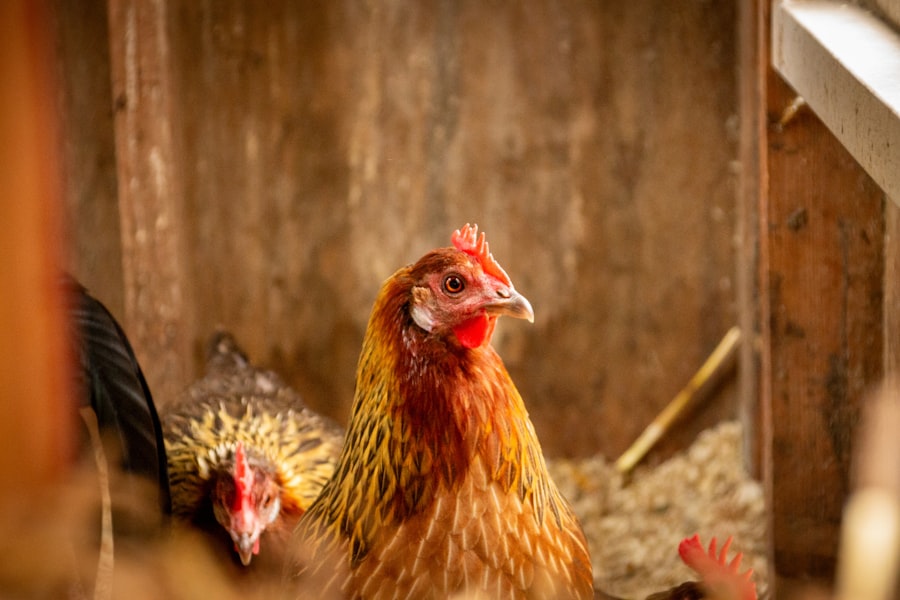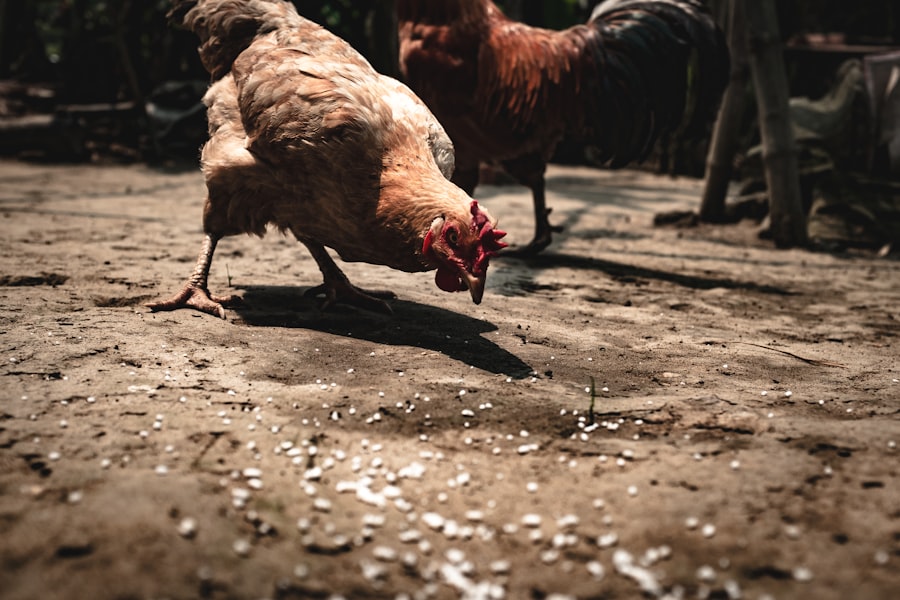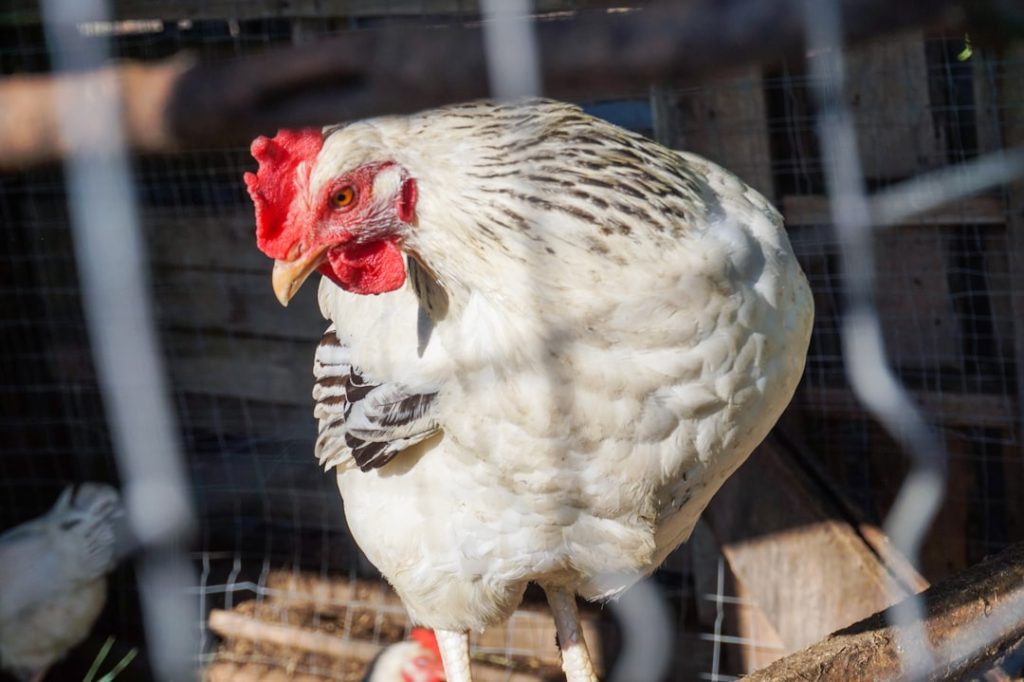When selecting chickens for a backyard flock, several factors should be considered. Climate is a crucial consideration, as some breeds are better adapted to cold weather, while others thrive in warmer conditions. The intended purpose of the flock is also important, whether it’s primarily for egg production or for both eggs and meat.
Some breeds are known for their high egg-laying capacity, while others are valued for their meat quality. The temperament of the breed should also be taken into account, especially if there are children or other pets present. The Rhode Island Red is a popular breed for backyard flocks due to its hardiness and adaptability to various climates.
These chickens are prolific layers of large brown eggs. The Plymouth Rock is another common choice, known for its friendly nature and environmental adaptability. For those seeking a dual-purpose breed, the Orpington is a suitable option, recognized for its substantial size, quality meat, and good egg production.
The optimal breed for a backyard flock depends on specific requirements and preferences. Thorough research is essential before making a final decision to ensure the chosen breed aligns with the keeper’s needs and local conditions.
Table of Contents
Key Takeaways
- When selecting a breed, consider factors such as climate, space, and egg production to find the right fit for your needs.
- Coop and run considerations include providing adequate space, ventilation, and protection from predators.
- Feeding and nutrition are crucial for the health and productivity of your chickens, so ensure they have access to a balanced diet and clean water.
- Regular health check-ups, vaccinations, and parasite control are essential for maintaining the wellness of your flock.
- Proper egg collection and storage practices can help ensure a steady supply of fresh eggs, while handling and socializing your chickens can help them become more friendly and easier to manage.
- Protecting your chickens from predators requires secure fencing, predator-proof coop design, and vigilance in monitoring for potential threats.
Coop and Run Considerations
Security and Predator-Proofing
When setting up a coop and run for your backyard chickens, security and predator-proofing should be top priorities. This means using sturdy materials and ensuring that there are no gaps or openings that could allow predators to gain access.
Space and Exercise
In addition to a secure coop, your chickens need plenty of space to roam and exercise. A good rule of thumb is to allow at least 4 square feet of coop space per chicken, as well as at least 10 square feet of outdoor run space per chicken.
Coop Design and Layout
When it comes to coop design, there are many options to choose from, including traditional wooden coops, modern plastic or metal structures, and more. Regardless of the material you choose, it’s important to ensure that your coop is well-ventilated, provides plenty of natural light, and has a thoughtful layout that includes nesting boxes for egg-laying and roosting bars for sleeping.
Outdoor Run Essentials
The outdoor run should provide plenty of shade and protection from the elements. Consider adding enrichment items, such as perches or dust baths, to keep your chickens entertained and stimulated.
Feeding and Nutrition

Proper feeding and nutrition are essential for keeping your backyard chickens healthy and happy. When it comes to feeding, it’s important to provide a balanced diet that meets all of your chickens’ nutritional needs. This means offering a high-quality commercial feed that is specifically formulated for laying hens.
You may also choose to supplement their diet with kitchen scraps or treats, but it’s important to do so in moderation and make sure that they are receiving all of the essential nutrients they need. In addition to their regular feed, it’s important to provide your chickens with access to fresh water at all times. This means regularly cleaning and refilling their waterers to ensure that they always have access to clean water.
You may also want to consider adding some vitamins or supplements to their water to help support their overall health and well-being. Finally, it’s important to provide your chickens with access to grit, which helps them digest their food properly. Grit can be provided in a separate feeder or scattered on the ground for them to peck at as needed.
Health and Wellness
Keeping your backyard chickens healthy and well is essential for their overall well-being and productivity. One of the most important aspects of chicken health is disease prevention. This means practicing good biosecurity measures, such as keeping your coop clean and free of pests, as well as quarantining any new birds before introducing them to your existing flock.
It’s also important to keep an eye out for any signs of illness or injury in your chickens and seek veterinary care if necessary. In addition to disease prevention, it’s important to provide your chickens with regular access to fresh air and sunlight. This helps support their immune system and overall health.
You’ll also want to make sure that your coop is well-ventilated and provides plenty of natural light. Regularly cleaning and maintaining your coop is also essential for preventing disease and keeping your chickens healthy.
Egg Production and Collection
If you’re raising chickens primarily for egg production, there are several things you can do to help support their laying abilities. First and foremost, it’s important to provide your hens with a high-quality commercial feed that is specifically formulated for laying hens. This will help ensure that they are receiving all of the essential nutrients they need to produce high-quality eggs on a regular basis.
You may also choose to supplement their diet with kitchen scraps or treats, but it’s important to do so in moderation and make sure that they are still receiving all of the essential nutrients they need. In addition to their diet, it’s important to provide your hens with a comfortable and stress-free environment. This means providing them with plenty of space to roam and exercise, as well as access to fresh air and sunlight.
You’ll also want to make sure that their nesting boxes are clean and comfortable, as this will help encourage them to lay their eggs in the designated area. When it comes time to collect the eggs, it’s important to do so on a regular basis to prevent them from becoming dirty or damaged. You’ll also want to make sure that you store the eggs properly to ensure their freshness and quality.

Building Trust through Gentle Handling
When handling your chickens, it’s essential to approach them calmly and gently. This helps build trust between you and your birds, making them more comfortable with being handled.
Regular handling from a young age is vital for your chickens to become accustomed to human interaction. This, combined with socialization among themselves, is crucial for their overall well-being.
Providing Enrichment and Building a Positive Relationship
Providing your chickens with plenty of space to roam and interact with each other, as well as enrichment items like perches or dust baths, is essential. You can also spend time with your chickens in their coop or run, talking to them or offering treats, which helps build a positive relationship between you and your birds, making them more comfortable around you.
Predation and Protection
Protecting your backyard flock from predators is essential for their safety and well-being. There are several steps you can take to help keep your chickens safe from predators. First and foremost, it’s important to make sure that your coop is secure and predator-proof.
This means using sturdy materials and ensuring that there are no gaps or openings that could allow predators to gain access. You may also want to consider adding some additional security measures, such as motion-activated lights or alarms. In addition to securing your coop, it’s important to provide your chickens with a safe outdoor run area that is protected from predators.
This may involve installing a fence or barrier around the perimeter of the run, as well as adding some additional protection such as netting or wire mesh over the top of the run. It’s also important to be vigilant about potential predators in your area and take steps to deter them from coming near your flock, such as removing food sources or using deterrents like noise makers or predator decoys. In conclusion, raising backyard chickens can be a rewarding experience, but it requires careful consideration and planning.
By selecting the right breed, providing a secure coop and run, offering a balanced diet, maintaining their health and wellness, supporting egg production, handling and socializing them properly, and protecting them from predators, you can create a safe and comfortable environment for your flock to thrive in. With proper care and attention, your backyard chickens can provide you with fresh eggs, entertainment, and companionship for years to come.
If you’re interested in learning more about keeping chickens, you might also want to check out this article on renting a chicken coop. It provides valuable information on how to provide a suitable living space for your chickens, which is essential for their health and well-being.
FAQs
What are some important factors to consider when choosing chickens?
When choosing chickens, it’s important to consider factors such as the climate in your area, the space you have available for the chickens, the purpose of keeping chickens (eggs, meat, pets), and the breed’s temperament and egg-laying capabilities.
What are some popular chicken breeds for beginners?
Some popular chicken breeds for beginners include the Rhode Island Red, Plymouth Rock, Sussex, and Orpington. These breeds are known for being hardy, docile, and good egg layers.
How much space do chickens need?
Chickens need at least 2-3 square feet of coop space per bird, and at least 8-10 square feet of outdoor space per bird. It’s important to provide enough space for the chickens to move around comfortably and engage in natural behaviors.
What do chickens eat?
Chickens eat a diet that consists of layer feed, scratch grains, and occasional treats such as fruits and vegetables. It’s important to provide a balanced diet to ensure the chickens’ health and egg production.
How do you keep chickens safe from predators?
To keep chickens safe from predators, it’s important to secure the coop and run with sturdy fencing, lock the coop at night, and use predator-proof latches. Additionally, providing a secure and covered area for the chickens to roam during the day can help protect them from aerial predators.
How do you keep chickens healthy?
To keep chickens healthy, it’s important to provide a clean and dry living environment, regular access to fresh water, a balanced diet, and regular health check-ups. Additionally, practicing good biosecurity measures can help prevent the spread of diseases.
Meet Walter, the feathered-friend fanatic of Florida! Nestled in the sunshine state, Walter struts through life with his feathered companions, clucking his way to happiness. With a coop that’s fancier than a five-star hotel, he’s the Don Juan of the chicken world. When he’s not teaching his hens to do the cha-cha, you’ll find him in a heated debate with his prized rooster, Sir Clucks-a-Lot. Walter’s poultry passion is no yolk; he’s the sunny-side-up guy you never knew you needed in your flock of friends!







